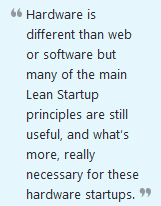Hardware startups and Lean Startup: a complicated but successful relationship
I’ve been working with many startups recently, mainly using Lean startup methods, and it has been quite accepted. But one industry where things seem to be different is hardware. I’ve been working with this kind of startup mainly in Berlin Hardware Accelerator, but also in Startup Weekend (Berlin, Paris…), and some training programs.  I’ve also been sharing ideas with other entrepreneurs and accelerators in the industry. Of course, hardware is so different than web or software: timeframes, investment needs, team composition… but many of the main Lean Startup principles are still useful, and what’s more, really necessary for these hardware startups.
I’ve also been sharing ideas with other entrepreneurs and accelerators in the industry. Of course, hardware is so different than web or software: timeframes, investment needs, team composition… but many of the main Lean Startup principles are still useful, and what’s more, really necessary for these hardware startups.
The main problem with hardware startups is that they are focused on the product, many times more than on the business, and because they know or feel there’s a long path, they feel confused and usually they don’t have a clear plan.
There is not a lot of specific information about this industry, and here I’m not trying to show the complete solution, but I would like to highlight some areas or phases of the startup where the mix of Lean Startup principles, facts about the industry, and best practices could be helpful.
- Hardware business by itself: as in all the industries some topics are quite special, probably well known, but also good to be reminded of.
- Massive market: it’s likely if you’re doing something for professional use in a B2B market you’re familiar with, it won’t be so complicated, but when you’re going to a big B2C market you need to pay attention to some details. Making mistakes when thousands of units are involved and you’re using months of work and thousands of euros is not a good idea.
- Crowdfunding campaigns (and II): this is the first idea many projects have, but it’s a really unique way to get money, so be sure it’s the right one for you and you launch it at the right moment.
- How to test: more than product testing it’s about market and user needs fitting, as always in Lean Startup, but here with some differences.
- Complicated products: some problems could also appear in B2B markets, especially when hardware is involved but it’s not the business alone. And many projects are going there because hardware as a service is more attractive than selling gadgets.
In the following posts I’m going to go into these topics, starting here with the broad vision of the hardware business.
Hardware business by itself:
People say “Hardware is hardware”, but someone should do it. And I’m sure there are many opportunities in this sector. So many products to change and old industries need to modify the way they work.
There are so many barriers in this business. But these exist for you and for upcoming competitors, so each one you pass is an advantage in the market for your company. These barriers also make these projects go slower than wanted, but there’s not a lot to be done about it.
For investment, time and money needs are higher than for usual web projects, so special investors are needed. They should know it and accept it, and they exist, every day more, but probably not yet enough (e.g. Point Nine Capital focusing in HAAS).
Certifications such as CE stamp, TÜV in Germany… are needed, you only need them for the product, so if you find different uses for the same device is great. Also this is a problem for crowdfunding campaigns under 100K€ because the cost of these certifications has a high impact on the total budget.
Maybe in the prototyping and testing phases you can skip it, but if you start selling it’s absolutely necessary. That also depends on the risk involved. It’s not always the same. Something with a small battery is different than a plugged in device, and a toy is not the same as a medical device. So it’s not only about regulations, many times there are ethical topics to be considered in case of failure.
When we do financial plans, the first two years of hardware startups are difficult, or at least challenging. This is because it involves B2C (crowdfunding), manufacturing, B2B… also you can overlap some of these tasks, probably not 100% but reducing the total time of the project significantly.
Despite the barriers and difficulties, hardware is an emerging area. it’s more than a promising prospect but far from maturity with space for many innovative projects.
Version ES


